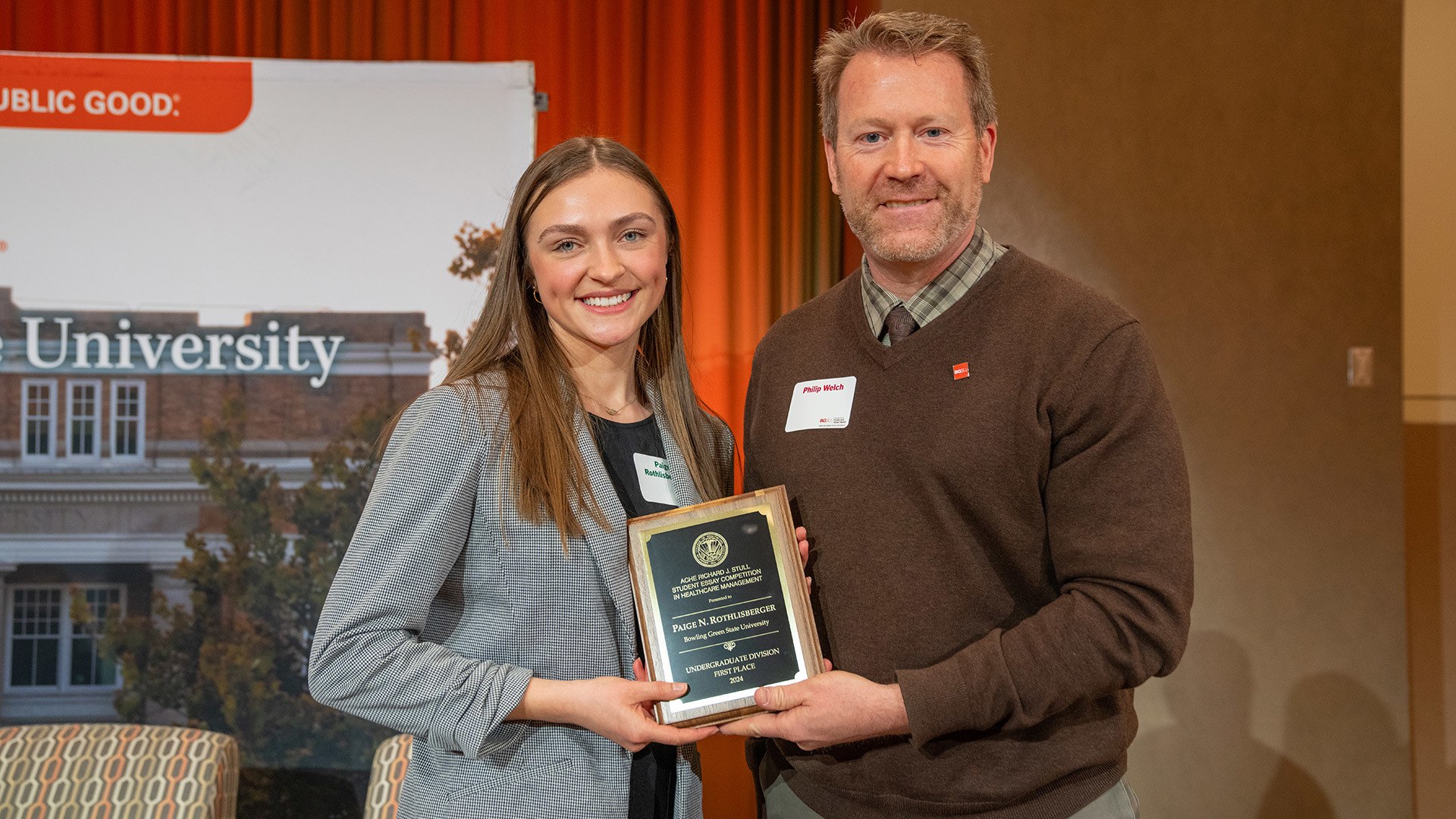
BGSU senior earns national award for innovative essay on AI in healthcare
Estimated Reading Time:
Paige Rothlisberger uses research to examine how healthcare leaders can prepare for AI-related innovation
By Nick Piotrowicz
As Bowling Green State University senior Paige Rothlisberger began researching AI in physical therapy for an essay, she thought there was too much to be said to focus on only one area of healthcare.
AI has the propensity to usher in big changes, so the topic is something healthcare administrators should be discussing thoroughly across multiple healthcare-related fields, she said.
During Rothlisberger’s research, she came to the conclusion that, even with the possibility of processes changing, one thing should remain the same: Patients have to be at the center.
As with any new introduction of technology, Rothlisberger said patients’ needs are the most important consideration.
“The patient truly has to be your first priority, so that was a light bulb moment for me to realize that AI and patient-centered care have to go together,” Rothlisberger said. “Everything I read about AI was all about processes and streamlining processes, how we can make something more efficient. Really, it all boils down to whether the patient comes first.”
The conclusions Rothlisberger, a native of Arlington, Ohio, who is graduating at Spring 2024 Commencement, made in her essay, “AI Powered Patient-Centered Care: A Call to Action for Innovation,” resonated with healthcare administrators.
Her essay won first place in the undergraduate division of the nationwide Richard J. Stull Student Essay Competition, after which she was invited to Chicago to speak at the American College of Healthcare Executives’ 2024 Congress on Healthcare Leadership.
Rothlisberger worked closely with Dr. Phillip Welch, an associate professor in the Department of Public and Allied Health, to apply classroom learning to healthcare administration as she crafted her essay.
Welch said Rothlisberger’s curiosity helped her work through several drafts of what became an essay that was honored on a national level.
“Paige, like most people drawn to a university, is intelligent and inquisitive,” Welch said. “But she stepped outside her comfort zone, took extra initiative to enter the essay contest and was rewarded for doing so. This experience taught Paige the value of taking a chance.
“The essay competition made Paige a stronger scientific writer, reinforced the importance of consulting academic literature when faced with problems and honed critical thinking skills.”
Due to the broad nature of AI, Rothlisberger said one of her goals for the essay was to spur discussion about how AI can work in healthcare, as its implementation will not happen overnight.
“It’s just so complicated because you can’t just implement AI and have it all figured out — there are a lot of things that go into it, so these are conversations you have to have,” Rothlisberger said. “I went into the essay knowing that AI in healthcare is going to be implemented in stages and it is going to be very important to understand the details in each stage.”
Rothlisberger said AI has many possibilities within healthcare, but one way in which it could truly help patients is to streamline options after a diagnosis to help cater treatment to a patient’s unique needs and wants.
“When you’re diagnosed with something, you have so many different options,” she said. “Maybe you have the option of something less invasive, the medication route or maintenance. One of the things I examined was using AI to filter what a diagnosis might look like along with the patient’s preferences and previous data to get a more tailored outcome for the patient rather than a one-size-fits-all solution.”
Through completing the paper and attending the Congress on Healthcare Leadership, Rothlisberger said the experience affirmed that she has found her career path.
“I just felt really proud to be a future healthcare administrator,” she said. “It’s definitely a rewarding field where people band together and it’s not competitive. Everybody wants to help each other out because that means you all go back to help your communities get better outcomes. This really established for me where I was going.”
Related Stories
Media Contact | Michael Bratton | mbratto@bgsu.edu | 419-372-6349
Updated: 08/19/2025 01:24PM




